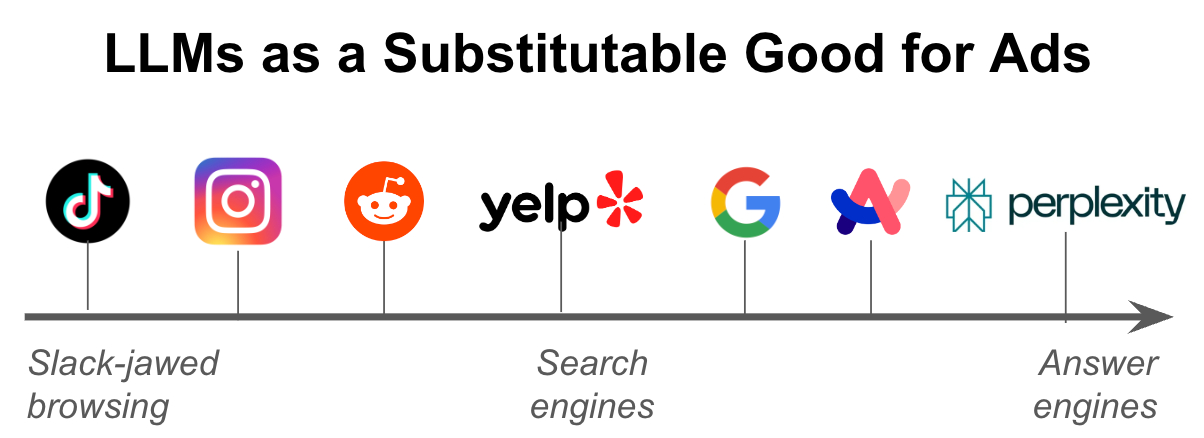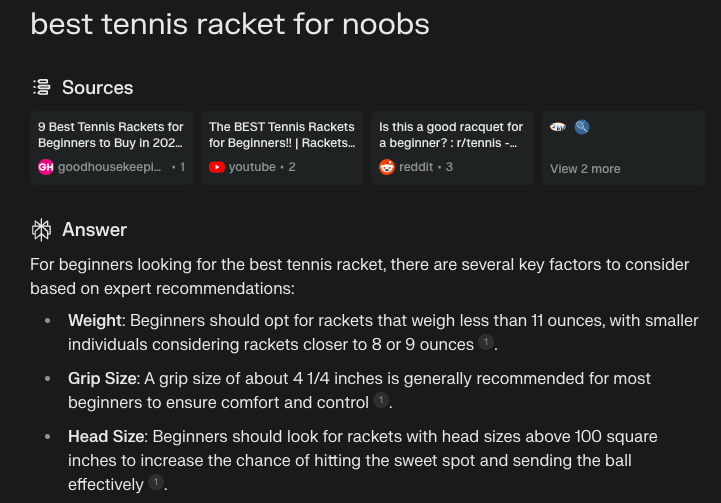
AI is going to fundamentally change ads and, with it, the internet. Smart investors, founders, and researchers will try and get a grip on that change early. The job of advertising won’t disappear, but how and when we access ads will. Let me walk you through where we are now and where we will be going.
Ads are more important than you think
The theory goes something like this: When you give something away for free, people will use it more. If users interact with your free service in a way that allows you to better target ads, you have made an incredible flywheel of growth (like Google or Meta).
This flywheel subsidizes the entire consumer internet. Video, social media, news, maps—all of these services rely directly or indirectly on advertising subsidies.
Over the years, people have grown frustrated with the more unsavory aspects of ads—pop-ups and privacy invasions, to name two. I agree with much of the criticism. Ads can be intrusive and invasive, and the desire to maximize the time users spend on free services can lead to harmful addictions. I have written for years how dangerous ad models can be, so I’m not trying to defend them as some holy paragon.
However, the criticism misses some of what is integral about ads. There is a popular quote that has bugged me for years. You’ve seen it before: “If the service is free, you are the product.” No! Wrong! If the service is free, the clicks on the ads are the product. This is fundamentally different. A free service with ads is monetizing users’ actions, not users themselves. Clicks on ads are good because they reveal a genuine demand for the goods the supplier is selling. Users see stuff they want to buy. Ad platforms make money off the top. This is wonderful! Everyone wins in this transaction. In return, we get an abundance of cheap or free goods. This system has made lots of money for everyone involved: Ads have been between 1–2 percent of U.S. GDP since 1920—currently a $361 billion annual business.
The ad engine is the heart of the internet. Every B2B transaction, SaaS app, and content website is reliant on the flow of user attention. Since ads subsidize essentially every step of the attention funnel, all digital services are reliant on them, directly or indirectly. In academic terms, advertising is the entrenched techno-economic paradigm that dictates how attention flows around the world.
AI is going to change our ad experience and, with it, the internet.
The AI-disrupts-ads argument is complicated
The question for AI is when it acts as a replacement for what would have previously been an ad. I would suggest that the closer a user goes to wanting a specific task done or question answered, the more likely it is to be replaced by an AI product.
Source: Graphic by the author.
The further to the right a product is on our scale, the more likely it is to be a purely LLM-driven experience. An easy example to grok is Google. Rather than getting 10 blue links from Google for a search request—where you have to click through multiple links to find the information you are looking for—you can use something like Perplexity, an LLM-powered “answer engine,” which will just answer your question.
The problem is that this experience sends far less traffic to content websites and, by extension, surfaces way fewer ads. Look how many results there are for my search for “best tennis racket for noobs.” There is space for maybe one ad, and the links to sources are not very prominent. (Further down in the answer, Perplexity recommended specific rackets).
The Only Subscription
You Need to
Stay at the
Edge of AI
The essential toolkit for those shaping the future
"This might be the best value you
can get from an AI subscription."
- Jay S.
Join 100,000+ leaders, builders, and innovators

Email address
Already have an account? Sign in
What is included in a subscription?
Daily insights from AI pioneers + early access to powerful AI tools









.08.31_AM.png)

Comments
Don't have an account? Sign up!
I think that in the future it will be similar to now. If you google something today the first 4 items are ads, so Google shifted the best organic results for the company that paid the most. I think in the future probably the first 4 results of what an LLM will output will be paid. If you ask it: what are the best tennis balls, the first four results will be paid and the rest is what the LLM would show you organically. So the principal will be the same and it will probably be even harder to distinguish, what is the AIs „intelligence“ and what is their because a company paid for it. This will even be scarier if our (free) AI Agent doesn‘t buy the item that is best for us but the item a company paid to show the agent first.
@rafael.ungvari Maybe? on a technical level I don't know you accomplish that. I think LLMs act has harbingers of truth in a way that google doesn’t and isn’t congruent with native advertising. Not trusting 1 of 10 blue links is normal. Not trusting the total answer of an LLM is bad.
Evan, I think you might be misunderstanding the "you are the product" idea.
You wrote:
However, the criticism misses some of what is integral about ads. There is a popular quote that has bugged me for years. You’ve seen it before: “If the service is free, you are the product.” No! Wrong! If the service is free, the clicks on the ads are the product. This is fundamentally different. A free service with ads is monetizing users’ actions, not users themselves.
Here's the way the media company thinks about this:
"We need to go sell our ads. We're going to be able to do that with two things:
1. the demographics of the audience. Are they a group that advertisers want to reach. (worth highlighting that the ad people use the word 'target' which of course, is a hunting term).
2. the actions of the audience. Can we get them in the mood to do something.
But in both cases, what's on offer is the audience. Their attention and the manipulation/shift in their actions.
Is there any doubt that using Facebook changes the people who use it? Changes their attention, their point of view, their heartrate, heartbreak and actions?
FB changes people the way US Steel changes iron.
That's what their factory does.
@sethgodin Thanks for the feedback! I personally delineate between users actions on the free platform vs users interaction with the ads. All the targeting in the world doesn't make a difference if the user doesn't actually engage with the ad. Audience action>audience access.
Facebook does change people who use it, but that is just as much through the interaction with the content as the advertisements. I would agree this is net bad but I feel that way about many content publishers and platforms. (which is what I called out here https://every.to/napkin-math/the-addiction-economy).
There is also a degree of infantilization that I disagree with in the "ads manipulate people view." People have agency and there is no threat of violence in an advertisement—they still have the free will to buy or not buy.
Thanks again for the feedback!
@ItsUrBoyEvan Well...
Do you think FB (or the New Yorker) is architected the way it is because of the business model?
https://www.ncbi.nlm.nih.gov/pmc/articles/PMC7173757/
Of course ads work. And ads manipulate us when they encourage us to do something we regret later.
It's a trap to pretend that it's all benign. Of course some serve a useful purpose. But they don't belong everywhere, they shouldn't be permitted to be targeted at everyone, and most of all, the creators of the media and the ads should take responsibility for the effects (not side effects) of their work.
Great article, Evan, and an incredibly important topic! One thing to recognize: The people at Perplexity are almost certainly planning how to monetize their LLM-based search engine beyond (or replacing) the $20/month subscription. I don't think they would want to offer advertisers the ability to influence answers, as that would destroy user trust. Instead, I imagine advertisers offered the ability to place their own LLM-based answers in parallel (to the right?) with these answers steering users to their products and providing hyperlinks to their own websites. Google could adopt this approach, thereby preempting such a move by Perplexity. Such an approach by LLM-based search engines could preserve the advertising revenues in the "system" while also creating greater value to users.
Clicks on ads are the result of people's actions. They can't be separated as inanimate. The "...you are the product" business drives this point home, but I don't like it.